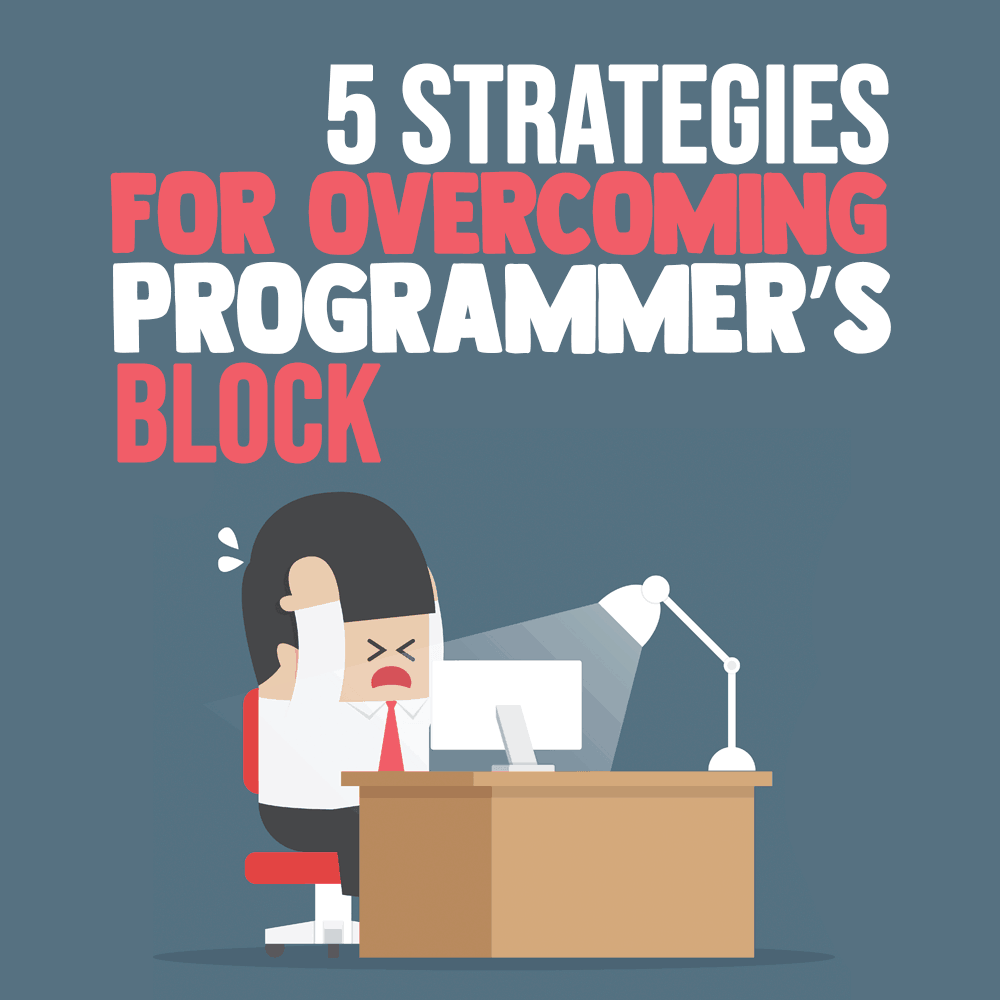
Programmer’s block is a period where a coder is unable to write any code at all. During this period, ideas don’t materialize, and the objectives of the project appear out of reach.
The good news is that this condition is normal—though it may be considered a medical condition if it keeps recurring. In most cases, it goes away naturally, even if you take no action to address the situation.
Unfortunately, we programmers work against time, meaning that any minutes spent procrastinating can be costly. As such, whenever you find yourself going through a mental block, it becomes crucial that you find your way out as soon as possible.
The following are five common manifestations of coders block and practical ways to resolve the problem;
Case #1: You’re Not 100% Clear on the Goal
One of the major issues with mental block is that it causes you to forget about your goals. You become so lost and confused that you lose sight of what you’re doing. When this type of mental block occurs, there are several steps you can take to regain control.
First, revisit your goals. Hopefully, you have the goals written down somewhere. When you have written goals, you can go back to find out where you went wrong if you get stuck. If you don’t have written goals, another possible solution is to go back to the beginning of the project. Revisiting where it all started is more than likely to jog your memory on where you ought to be headed.
However, if going back to the beginning of the project doesn’t help, take a few more steps back: Ask yourself why you’re doing the project in the first place. Why is that code important? What is its purpose? If you can answer even just one of these questions, you should be able to find your way back into action.
Case #2: You Keep Changing Your Mind on the Approach
Strategy is a vital part of programming. You want to minimize resources while maximizing productivity. For instance, you may want to complete the section with a looming deadline faster. Unfortunately, thinking of a great strategy may be a problem when you have a mental block, a situation that often leads to a self-doubt loop where you begin poking holes into every solution that comes to mind.
Whenever you find yourself in a self-doubt loop, it’s time to break the cycle. Stop programming, and instead, take a short walk or go have a random conversation with someone—about something completely non work-related. Taking a break will give your brain the time it needs to get its thoughts in order.
Don’t break for too long, though, as you could lose all motivation to keep working that day. Once you’ve rested for 15-20 minutes, get back to work—but with two things in mind. First, come back with a fresh perspective. Try to look at the problem (not the solution) from a different angle. Secondly, don’t let perfection be the enemy of good; you don’t have to be perfect, but you do have to finish the project.
Case #3: The Work Seems Like It’s too Much. Where Do You Start?
Whenever you look at a project and feel overwhelmed, you may start to feel defeated before you even begin coding. There’s only one solution to this problem—break down your projects into manageable chunks.
Studies show that when you feel a task is simple and easy to accomplish, you’ll be more motivated to work on it. This positive feeling can save you from procrastinating later on down the road.
Ideally, you should break the project into smaller, easily-doable bits, though some people prefer to plan using time rather than the project. For instance, you can decide to work for an hour and then take a mental break or work until the short-task is complete. Both are valid approaches and can vary in their effectiveness depending on the size of the overall project. For larger projects, however, splitting the load into manageable chunks is certainly the better option.
For even greater motivation, break down goals into macro-goals and the macro-goals into microgoals until you have jobs that can be completed in minutes rather than hours. Make sure to celebrate the competition of each and every microgoal. Doing so will ensure your success.
Case #4: You Don’t Feel Excited About the Work Ahead

Even when the work is minimal and both the goal and approach are clear, you may still feel uninterested in the purpose. Indeed, lack of interest is a big issue that has caused many programmers to abandon projects altogether.
The good news is, there are a couple of ways to boost your project excitement. First, consider the project as an opportunity to learn something new. For instance, consider using the project to try out a new library or framework.
Secondly, find reasons that make the work important. Why do you need to work on the project? Why now? Talking to the project manager or the customer (for freelancers) can prove incredibly helpful here.
Another possible solution is to use the opportunity to fix a technical deficit. For instance, if the work requires the use of a new programming language, this could be the time to polish your knowledge of the language if that’s something you’ve been postponing for a while.
Case #5: Something in Your Life or the Work Environment Is Bothering You
It’s also possible for mental block to arise from personal issues or the work environment. Are you feeling sick? Do you have a problem with a personal relationship or marriage? Do you have an unwell child at home? All these are issues that can cause a serious mental block and hinder your ability to stay on task.
The same applies if you’re working in an unfriendly environment. Some studies suggest that when it’s too hot or cold, the mind drifts and begins to focus on maintaining the body’s temperature. These types of distractions could be some of the reasons why you can’t concentrate on your project.
For personal issues, the best solution is to fix the situation first or at least talk about it with a friend or a professional. If you’re sick, seek medical treatment straight away, and resume coding when you feel better. If it’s something like the kid that’s feeling unwell, take them to the hospital. Taking care of your personal life first will clear your mind and allow you to stay focused when at work.
For your work environment, proper heating and air conditioning can help you and your colleagues to stay on task. Also, bring in an air purifier to boost air quality and humidifiers to add moisture to the room. These slight adjustments to your work environment can make all the difference when battling programmer’s block and should help you block out any distractions and get your work done.
You Can Overcome It
Programmer’s block isn’t a new problem. It affects every programmer, not just you. Thankfully, it’s not a situation you can’t deal with. The above points should help you identify and resolve the block so you can resume work with a clear mind.
